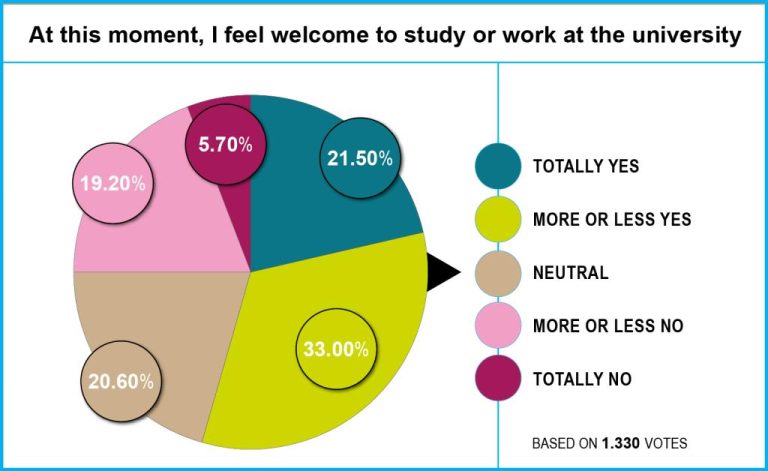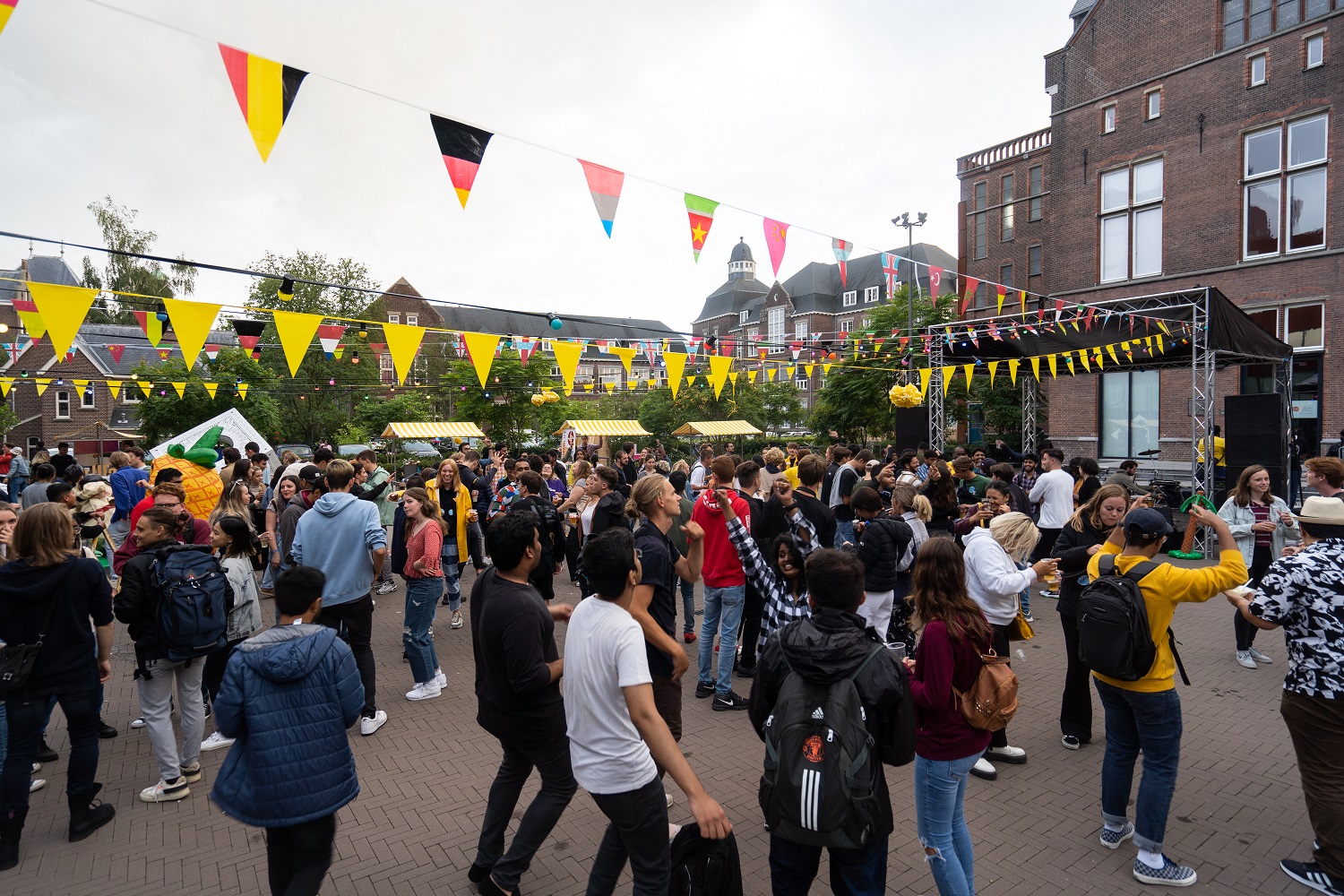Internationals are feeling less welcome at Dutch universities. This emerged from a nationwide survey. ‘There is a glass ceiling for non-Dutch professionals.’
TU Delft students during the 2021 BASE Festival, organised by international student associations. (Photo: Daniël Korvemaker)
Fewer English-language subjects and a cap on the number of international students. These plans are on the House of Representatives’ agenda and may put pressure on the position of international students at universities. How welcoming are Dutch universities for internationals? Delta and other universities and universities of applied sciences in Groningen, Utrecht, Enschede, Nijmegen and Wageningen in the Netherlands looked into this.
Less welcome
The figures around the country showed that 70% of international students and employees felt welcome or even very welcome when they came here. This has now dropped to 55%. About half the respondents believe that this is because the political landscape in the Netherlands is becoming ever more negative about internationals.


(Illustration: Helga Wellink / DUB)
The feeling that they are less welcome is less pronounced within the university, than outside of it. In light of the current debate, various students and staff members say that TU Delft is a ‘safe bubble’. ‘As TU Delft is so international, I don’t feel that I am in the Netherlands’, states one bachelor’s student.
‘Internationals are becoming the scapegoat for several “Dutch” problems’
‘Within the university we are protected to some degree from the growing anti-international sentiment, states a TU Delft master’s student. ‘Outside it is becoming harder to escape the increasing criticism. Internationals are becoming the scapegoat for several “Dutch” problems such as the housing crisis, main language spoken, and cost of living.’
Nevertheless, the majority of the respondents still recommend studying or working in the Netherlands. ‘Compared to other countries, the Netherlands is welcoming’, states one respondent. ‘But it is hard to find accommodation.’ Another refers to the high quality of education. ‘This balances out any problems with integrating.’
‘I feel like a second class citizen in my job in the Netherlands’
Not everyone agrees. ‘The Netherlands is not welcoming. Once I finish my degree programme I would rather move elsewhere’, says one student. ‘It is hard to find a decent job if you do not speak fluent Dutch’, says a TU Delft employee. ‘There is a clear glass ceiling for non-Dutch professionals that goes beyond the language barrier. I feel like a second class citizen in my job in the Netherlands.’
PhD candidates and post-docs
One fifth of the 174 TU Delft students and staff members who filled in the survey say that they are concerned about their position as a student or employee at TU Delft. Almost one third of the respondents are considering leaving the Netherlands. ‘It is the Trumpification (in Dutch, a cocktail of populism, coarseness and nationalism, Eds.) of the Netherlands’, one respondent called the current trend.
The PhD candidates and post-docs at TU Delft who filled in the questionnaire were proportionately the most concerned (55%). More than 60% of them are considering leaving the Netherlands. They are feeling less and less welcome or believe that the debate will spread to the labour market.
A statistician, Casper Albers (University of Groningen), does warn that the sample size of a small group such as PhD candidates and postdocs is too small to draw conclusions.
‘The current debate is pushing us back in time’
Nevertheless, Anneke Kastelein, Chair of Promovendi Netwerk Nederland (PNN, the national interest group for and by PhD candidates), recognises the signals. “International PhD candidates are worried that they will not master the Dutch language on time to teach at university level. This is a cause of stress, certainly for PhD candidates at the end of their track as it is not clear whether it would be a good thing to work at a Dutch institution.”
Kastelein believes that a lot has been done over the years in terms of creating inclusive workplaces for PhD candidates, but that the current debate is pushing us back in time. “PhD candidates are already under great pressure and being excluded from the workplace makes them more vulnerable to health or mental health issues or transgressive behaviour.”
Rebekka van der Grift, a member of Young Researchers’ Impact (YRI, the party for PhD candidates has six seats in the Works Council) said that she has not yet heard anything from concerned PhD candidates through the official channels. “We have heard it through our personal and job circles, and the Works Council is keeping the subject in mind.”
The University PhD Council therefore calls on PhD candidates to report their concerns. “The more people there are who express their worries, the higher the chance that the relevant departments at TU Delft address it,” says Chair Israel Carrete.
Accountability
In total, 1,330 respondents filled in the questionnaire, of whom 174 are connected to TU Delft. They comprise 129 students, 18 PhD candidates or post-docs, and 27 staff members. Of the respondents, 63% are male, 33% female, and 4% non-binary/queer.
The respondents were asked if they feel welcome in the Netherlands and at TU Delft and whether this has changed recently. They were also asked what impact the debate about internationalisation had on them.
The respondents were approached through various digital channels: the Delta website, newsletter, X, LinkedIn, Facebook and Instagram. As the questionnaire was open, it could be that people from outside TU Delft filled it in.
Casper Albers, the University of Groningen statistician, does warn that the sample size of a small group such as PhD candidates is too small to draw firm conclusions. He does say though that the results at country level are ‘quite representative’. The difference in feeling welcomed is particularly significant and not coincidental.
This survey was initiated by UKrant. Read more about the Groningen results here.
Do you have a question or comment about this article?
m.vanderveldt@tudelft.nl


Comments are closed.